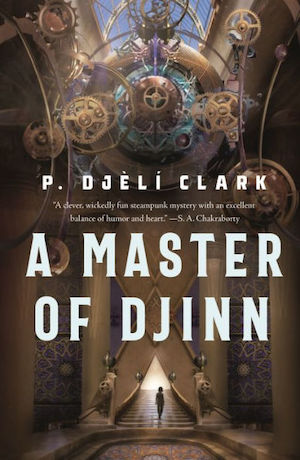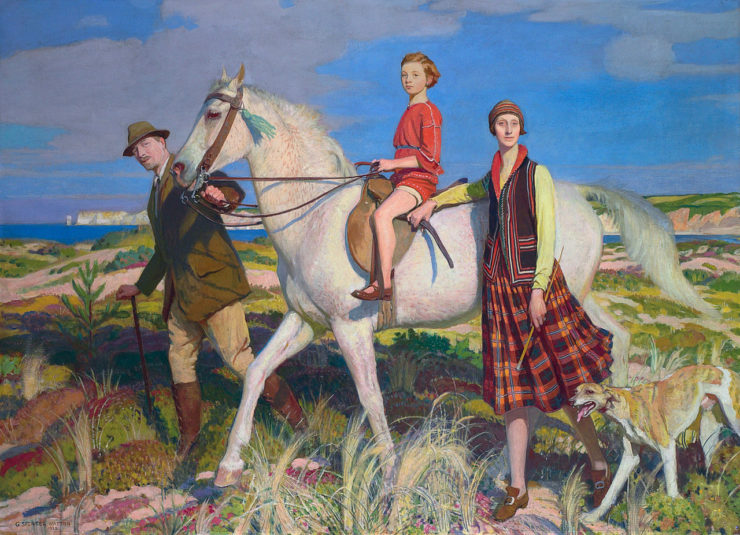I’ve talked a few times before about one of the most beloved science fiction and fantasy tropes: the animal companion. From the big and flashy and hugely popular McCaffrey and Novik dragons to the witch’s familiar or the ship’s cat (both in space and on the high seas), humans and animals have bonded with each other in work after work in the genre.
Horses have had their share of the attention. Lackey’s Companions are not really horses, but they appear in that form and in many perform that function, serving as transport and protection as well as magical soulmate. Gandalf’s Shadowfax was the ultimate one-man (or -Maia) horse, but he’s not the only named horse-companion in Tolkien. I’m partial myself to Glorfindel’s Asfaloth, and who doesn’t love good old Bill the pony?
Now Bill is an illustration of what I want to talk about here. It’s not the looks or the flash or the fancy that makes what I and others call a soul horse. It’s the bond. The connection between the human and the animal.
Sam Gamgee had it just as strongly with Bill as Gandalf did with Shadowfax. It was just as perfect a match. Plain practical Sam with his great heart and his deep core of courage is just the right person for a pony with these same sterling virtues. It broke his heart to have to abandon Bill at Moria, to have to choose between Frodo and his soulpony. I’ve always appreciated that Bill, being the plain practical creature he is, finds his way to safety and eventually back to Sam. That’s the way it should be.
As I’ve said in a previous article, both Lackey and McCaffrey based their magical bond on the real-world one between rider and horse. This bond can happen with any species. When it does, you have a soul beast.
It so happens that today, as I was getting ready to write this article, I was procras—er, noodling on twitter, and there were a number of threads that assured me once again that the universe likes its coincidences. One was a person who had to say goodbye to a beloved cat, and received many comments sharing people’s own much-loved felines and the pain of their loss. Another was a journalist talking about an incident during the Iditarod, and riffing off it to state their belief that not only are soul beasts a real thing, they don’t ever really leave, even when their bodies are gone. In sled-dog races, a the winning lead dog is awarded a golden harness. When one dies, they’re said to have won their silver harness. They join the great race in the sky, and follow the trail to the Northern Lights.
It’s not only in leaving us that our soul beasts reveal themselves. Far from it. We know them the moment we meet them. When the foal is born and lifts his head and meets your eye, you know, or you go to the auction or the breeding farm or the dealer’s string and there’s this one, maybe not the biggest or the prettiest or the fanciest and often it’s everything you said you did not want, but it’s the one you came for. Or the kitten climbs into the hollow of your shoulder and clings, or the stray cat slips through your door and stays, or the dog comes up to you at the shelter or in the breeder’s puppy nursery and that’s it. That’s the one you belong to.
It’s not just any animal. We love them all, though sometimes they can make it hard, but some are just that much more. They’re the ones we feel closest to. The ones who seem to share more with us, to connect more deeply. We gravitate toward them, and they to us. They’re not always glued to our side; we each have lives of our own, especially if the opposite number is a cat or a horse. But the world is most securely on its axis when we’re together.
Buy the Book


A Master of Djinn
That’s the soul beast. The witch’s familiar is a ritualized form of it. The devoted dog is a whole thing, and probably most celebrated, especially if the human dies first and the dog takes station on their grave. The horse doesn’t have quite the same body of myth around it, but it’s no accident that McCaffrey dragons are based on horses.
Horses are different in that, unlike dogs and cats, they tend not to live in the same space as the human. But the bond is no less strong. The horse will have their own life and space and preoccupations, while still being deeply connected with the human. It’s not dependent on Doing Things with the horse, either, notably riding or driving. A human and a horse can be soulmates without any of that, just being together, just as can happen with a cat or a dog (or a bird or a lizard or any other creature we share our lives with).
Riding adds a unique dimension. The cat in your lap, the dog at your side, has a definite physical connection. But here is this much larger animal who consents to carry you.
Any horse will connect with you when you ride. It has to. You’re sitting on its back, communicating with it, asking it to do things for you. Most horses will cooperate, because horses are inherently generous. A well-matched pair can accomplish a great deal together, and be very happy in their partnership.
But the soul horse is something more. That’s the horse who feels as if they were custom-made for you, and you for them. You sit on their back and you’re home. They may not be the easiest horse to ride, or even close to it, and they may ask a great deal of you in terms of subtlety and sensitivity, not to mention understanding and fairness. That’s all right; that means they’re there to teach you, and your job is to learn. What matters is that this is right. This is where you belong.
This kind of bond is not terribly rare, but it’s not common, either. Just as we can have multiple dogs or cats whom we love but who aren’t our soulmates, we can own or ride or spend time with many horses without making that deep connection. When it does happen, it’s a profound and special thing.
I began by talking about loss, because there’s been so much of it everywhere in the past year and more. Humans in the pandemic—so many lives gone, so much grief, so many sorrows—but animals, too. Sometimes my Facebook page or my twitter feed is one long series of obituaries for people’s cats and dogs and horses. Not all from old age or illness, either. Some suddenly, apparently out of the blue. There, and then not. The sled dog putting on her silver harness. The cat turning the final corner out of this life. The horse taking on the powers of the Otherworld, becoming Horse Between the Worlds.
I read once that to animals, we are, essentially, immortals. Our lives are so much longer than theirs, and we seem effectively ageless from the perspective of a creature with a lifespan of a decade or two. When the bond happens to us, we know that in all likelihood we will outlive our soulmate. There are people who won’t share their lives with animals for this reason: because what we love, we have to lose.
The rest of us know what we’re getting into, and it doesn’t stop us. However short or long the time may be, the bond we have with them, the connection that’s like nothing else, is worth it. All of it, even the pain at the end.
There’s a phrase my Jewish friends say in the time of loss, which I love. “May their memory be a blessing.” Truly. It is.
Judith Tarr’s first novel, The Isle of Glass, appeared in 1985. Since then she’s written novels and shorter works of historical fiction and historical fantasy and epic fantasy and space opera and contemporary fantasy, many of which have been reborn as ebooks. She has even written a primer for writers: Writing Horses: The Fine Art of Getting It Right. She has won the Crawford Award, and been a finalist for the World Fantasy Award and the Locus Award. She lives in Arizona with an assortment of cats, a blue-eyed dog, and a herd of Lipizzan horses.










